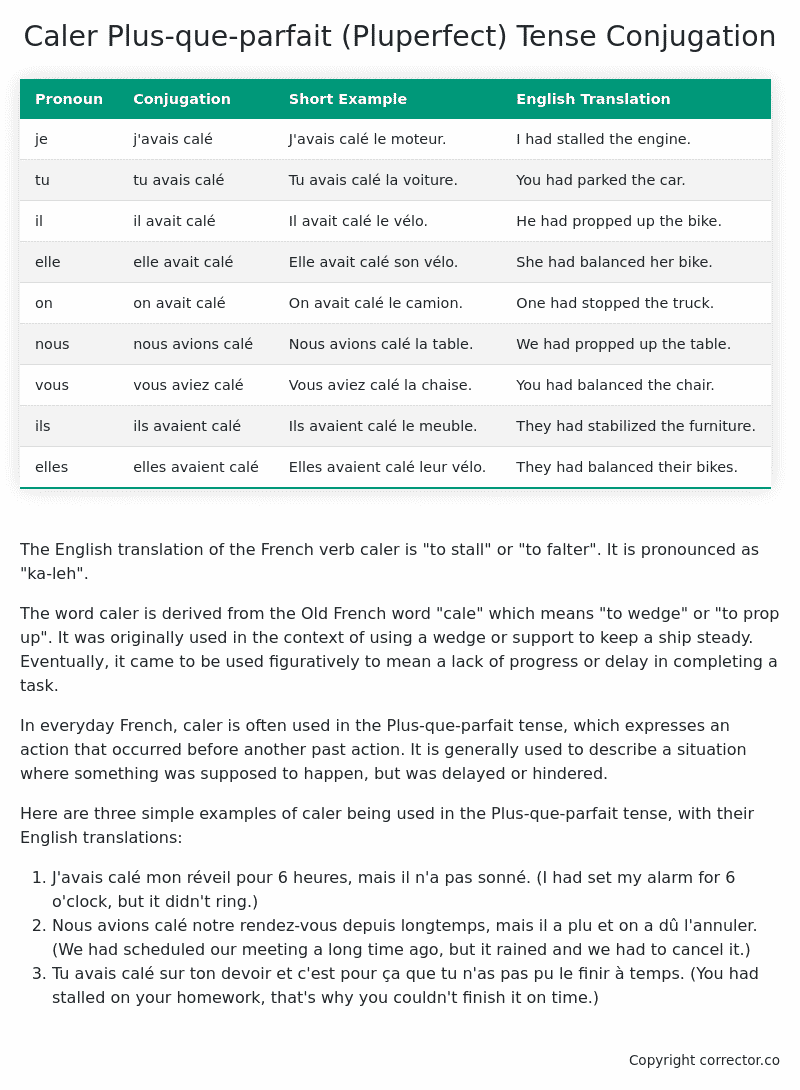Plus-que-parfait (Pluperfect) Tense Conjugation of the French Verb caler
Introduction to the verb caler
The English translation of the French verb caler is “to stall” or “to falter”. It is pronounced as “ka-leh”.
The word caler is derived from the Old French word “cale” which means “to wedge” or “to prop up”. It was originally used in the context of using a wedge or support to keep a ship steady. Eventually, it came to be used figuratively to mean a lack of progress or delay in completing a task.
In everyday French, caler is often used in the Plus-que-parfait tense, which expresses an action that occurred before another past action. It is generally used to describe a situation where something was supposed to happen, but was delayed or hindered.
Here are three simple examples of caler being used in the Plus-que-parfait tense, with their English translations:
- J’avais calé mon réveil pour 6 heures, mais il n’a pas sonné. (I had set my alarm for 6 o’clock, but it didn’t ring.)
- Nous avions calé notre rendez-vous depuis longtemps, mais il a plu et on a dû l’annuler. (We had scheduled our meeting a long time ago, but it rained and we had to cancel it.)
- Tu avais calé sur ton devoir et c’est pour ça que tu n’as pas pu le finir à temps. (You had stalled on your homework, that’s why you couldn’t finish it on time.)
Table of the Plus-que-parfait (Pluperfect) Tense Conjugation of caler
| Pronoun | Conjugation | Short Example | English Translation |
|---|---|---|---|
| je | j’avais calé | J’avais calé le moteur. | I had stalled the engine. |
| tu | tu avais calé | Tu avais calé la voiture. | You had parked the car. |
| il | il avait calé | Il avait calé le vélo. | He had propped up the bike. |
| elle | elle avait calé | Elle avait calé son vélo. | She had balanced her bike. |
| on | on avait calé | On avait calé le camion. | One had stopped the truck. |
| nous | nous avions calé | Nous avions calé la table. | We had propped up the table. |
| vous | vous aviez calé | Vous aviez calé la chaise. | You had balanced the chair. |
| ils | ils avaient calé | Ils avaient calé le meuble. | They had stabilized the furniture. |
| elles | elles avaient calé | Elles avaient calé leur vélo. | They had balanced their bikes. |
Other Conjugations for Caler.
Le Present (Present Tense) Conjugation of the French Verb caler
Imparfait (Imperfect) Tense Conjugation of the French Verb caler
Passé Simple (Simple Past) Tense Conjugation of the French Verb caler
Passé Composé (Present Perfect) Tense Conjugation of the French Verb caler
Futur Simple (Simple Future) Tense Conjugation of the French Verb caler
Futur Proche (Near Future) Tense Conjugation of the French Verb caler
Plus-que-parfait (Pluperfect) Tense Conjugation of the French Verb caler (this article)
Passé Antérieur (Past Anterior) Tense Conjugation of the French Verb caler
Futur Antérieur (Future Anterior) Tense Conjugation of the French Verb caler
Subjonctif Présent (Subjunctive Present) Tense Conjugation of the French Verb caler
Subjonctif Passé (Subjunctive Past) Tense Conjugation of the French Verb caler
Subjonctif Imparfait (Subjunctive Imperfect) Tense Conjugation of the French Verb caler
Subjonctif Plus-que-parfait (Subjunctive Pluperfect) Tense Conjugation of the French Verb caler
Conditionnel Présent (Conditional Present) Tense Conjugation of the French Verb caler
Conditionnel Passé (Conditional Past) Tense Conjugation of the French Verb caler
L’impératif Présent (Imperative Present) Tense Conjugation of the French Verb caler
L’infinitif Présent (Infinitive Present) Tense Conjugation of the French Verb caler
Struggling with French verbs or the language in general? Why not use our free French Grammar Checker – no registration required!
Get a FREE Download Study Sheet of this Conjugation 🔥
Simply right click the image below, click “save image” and get your free reference for the caler Plus-que-parfait tense conjugation!

Caler – About the French Plus-que-parfait (Pluperfect) Tense
Tense Formation
Common everyday usage patterns
Sequencing of past events
Background information
Hypothetical or reported speech
Interactions with other tenses
Summary
I hope you enjoyed this article on the verb caler. Still in a learning mood? Check out another TOTALLY random French verb conjugation!


